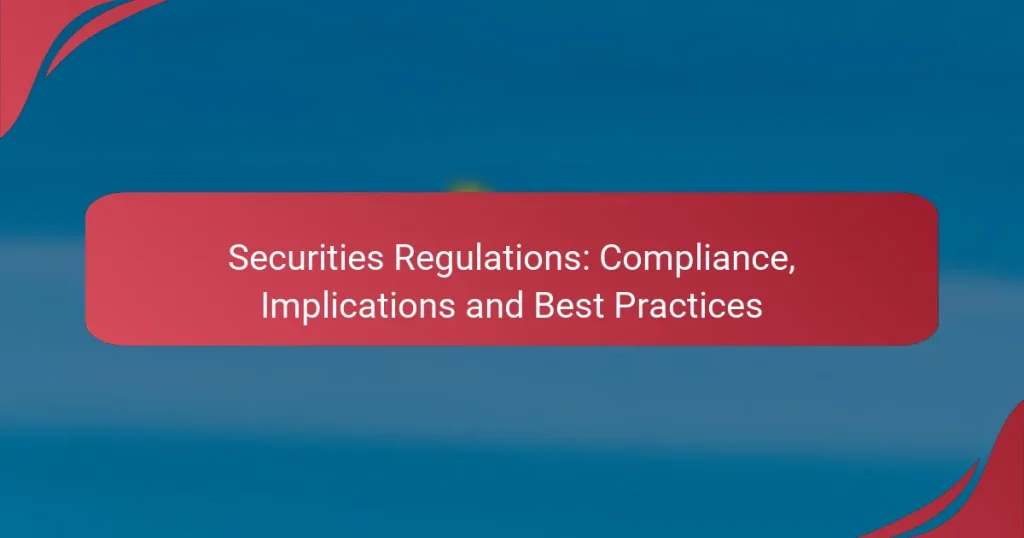Securities regulations play a vital role in maintaining fair and transparent markets by establishing compliance requirements for the issuance and trading of securities. For businesses, particularly in e-commerce, adhering to these regulations is essential to foster investor trust and avoid legal complications. Implementing best practices such as regular audits and employee training can significantly enhance compliance efforts and mitigate risks associated with securities transactions.

What are the key compliance requirements for securities regulations in the US?
The key compliance requirements for securities regulations in the US involve adhering to various laws that govern the issuance and trading of securities. These regulations are designed to protect investors and ensure fair markets, with specific obligations for companies and individuals involved in securities transactions.
Securities Act of 1933
The Securities Act of 1933 mandates that companies must register their securities with the SEC before offering them to the public. This act requires the disclosure of important financial information, enabling investors to make informed decisions.
Companies can use a registration statement, which includes a prospectus detailing the investment’s risks and benefits. Compliance with this act is essential to avoid legal penalties and ensure investor trust.
Securities Exchange Act of 1934
The Securities Exchange Act of 1934 focuses on regulating secondary trading of securities. It requires companies with publicly traded securities to file periodic reports with the SEC, ensuring ongoing transparency and accountability.
Key filings include annual reports (Form 10-K), quarterly reports (Form 10-Q), and current reports (Form 8-K). Timely and accurate reporting is crucial to maintain compliance and avoid sanctions.
Investment Company Act of 1940
The Investment Company Act of 1940 regulates investment companies, such as mutual funds, to protect investors from unfair practices. It requires these companies to register with the SEC and adhere to specific operational guidelines.
Investment companies must provide detailed disclosures about their investment strategies, fees, and performance. Compliance with this act helps maintain investor confidence and market integrity.
Regulation D exemptions
Regulation D provides exemptions from the registration requirements of the Securities Act for certain private placements. These exemptions allow companies to raise capital without undergoing the full registration process, provided they meet specific criteria.
Common exemptions include Rule 504, Rule 506(b), and Rule 506(c), which vary in terms of the amount raised and the type of investors involved. Companies must ensure they comply with the conditions of these exemptions to avoid penalties.
Reporting obligations
Reporting obligations under US securities regulations require companies to regularly disclose financial and operational information to the SEC and investors. This includes annual and quarterly reports, as well as disclosures of significant events.
Failure to meet these reporting obligations can result in severe consequences, including fines and reputational damage. Companies should establish robust internal controls to ensure timely and accurate reporting to comply with these requirements effectively.

How do securities regulations impact e-commerce businesses?
Securities regulations significantly affect e-commerce businesses by imposing rules that govern how they can raise funds and interact with investors. Compliance with these regulations is crucial to avoid legal pitfalls and ensure investor trust.
Investor protection measures
Investor protection measures are designed to safeguard individuals from fraudulent activities and ensure fair treatment in the investment process. E-commerce businesses must implement practices such as verifying investor identities and providing clear information about risks associated with their offerings.
For instance, businesses should conduct due diligence to assess the suitability of their investment opportunities for potential investors. This can include providing educational resources about the investment process and the specific risks involved.
Disclosure requirements for online offerings
Disclosure requirements mandate that e-commerce businesses provide comprehensive information about their financial health and the specifics of their offerings. This includes details like business plans, financial statements, and potential risks, which must be accessible to investors before they commit funds.
Failure to meet these disclosure obligations can lead to severe penalties, including fines and restrictions on future fundraising activities. Therefore, businesses should establish a robust compliance framework to ensure all necessary information is disclosed transparently and accurately.
Impact on crowdfunding platforms
Securities regulations have a profound impact on crowdfunding platforms, as they dictate how these platforms can operate and what types of offerings they can facilitate. Many jurisdictions require crowdfunding platforms to register with regulatory authorities and comply with specific operational guidelines.
For example, in the U.S., platforms must adhere to the JOBS Act provisions, which set limits on how much individuals can invest based on their income and net worth. E-commerce businesses utilizing crowdfunding should be aware of these limits and ensure they are compliant to protect both themselves and their investors.

What are the best practices for ensuring compliance?
Best practices for ensuring compliance with securities regulations include implementing regular audits, providing employee training, and consulting with legal experts. These strategies help organizations identify risks, educate staff, and stay updated on legal requirements.
Regular compliance audits
Conducting regular compliance audits is essential for identifying potential gaps in adherence to securities regulations. These audits should be scheduled at least annually, but more frequent assessments may be necessary depending on the organization’s size and complexity.
During an audit, review internal processes, documentation, and transaction records to ensure they align with regulatory standards. Consider using a checklist to cover key areas such as reporting accuracy, risk management, and internal controls.
Employee training programs
Implementing effective employee training programs is crucial for fostering a culture of compliance within the organization. Training should cover relevant regulations, company policies, and ethical practices, ensuring that all employees understand their responsibilities.
Consider offering training sessions at least once a year, supplemented by ongoing resources such as newsletters or online courses. Tailor the content to different roles within the organization to ensure relevance and engagement.
Consultation with legal experts
Regular consultation with legal experts is vital for staying informed about evolving securities regulations. Engaging legal counsel can help organizations navigate complex compliance issues and avoid potential pitfalls.
Establish a relationship with a legal advisor who specializes in securities law. Schedule periodic reviews to discuss changes in regulations and assess the organization’s compliance strategies, ensuring they remain effective and up-to-date.

What are the implications of non-compliance?
Non-compliance with securities regulations can lead to severe consequences for businesses, including financial penalties, damage to reputation, and disruptions to operations. Understanding these implications is crucial for maintaining compliance and protecting the integrity of your organization.
Legal penalties and fines
Legal penalties for non-compliance can vary significantly based on the severity of the violation and the jurisdiction. Companies may face fines ranging from thousands to millions of dollars, depending on the regulatory body involved. For instance, the U.S. Securities and Exchange Commission (SEC) can impose hefty fines for violations of securities laws.
In addition to fines, organizations may also encounter legal actions, including lawsuits from investors or regulatory sanctions that can further exacerbate financial losses. It is essential to have a robust compliance program to mitigate these risks.
Reputational damage
Non-compliance can severely tarnish a company’s reputation, leading to a loss of trust among investors, customers, and partners. Once a company is publicly associated with regulatory violations, it may struggle to regain credibility in the market. This reputational damage can result in decreased sales and a decline in stock prices.
To protect against reputational harm, organizations should prioritize transparency and proactive communication with stakeholders. Implementing strong compliance measures can help demonstrate a commitment to ethical practices and regulatory adherence.
Operational disruptions
Non-compliance can lead to significant operational disruptions, including the suspension of trading activities or the halting of new product launches. Regulatory investigations can divert resources and attention away from core business functions, impacting overall productivity.
Companies should develop contingency plans to address potential operational impacts from non-compliance. Regular training and audits can help ensure that employees are aware of compliance requirements and can respond effectively to any issues that arise.

How can businesses prepare for regulatory changes?
Businesses can prepare for regulatory changes by staying informed about updates, engaging with relevant industry groups, and adopting adaptable compliance frameworks. These strategies help organizations navigate the evolving landscape of securities regulations effectively.
Monitoring regulatory updates
Regularly monitoring regulatory updates is crucial for businesses to stay compliant. This can involve subscribing to newsletters from regulatory bodies, using compliance software, or setting up alerts for relevant changes in legislation.
Consider designating a compliance officer or team responsible for tracking these updates. They should review changes at least monthly to ensure the business remains aligned with current regulations.
Engaging with industry associations
Engaging with industry associations provides businesses with valuable insights and resources regarding regulatory changes. These organizations often offer training, networking opportunities, and access to expert opinions that can help companies adapt to new requirements.
Participating in workshops or conferences hosted by these associations can also facilitate discussions on best practices and emerging trends in compliance, allowing businesses to stay ahead of potential challenges.
Implementing flexible compliance frameworks
Implementing a flexible compliance framework allows businesses to adapt quickly to regulatory changes. This involves creating processes that can be easily modified as new regulations are introduced, rather than rigid systems that may become obsolete.
Consider using technology solutions that automate compliance tasks and provide real-time reporting. This can streamline operations and reduce the risk of non-compliance, ensuring that businesses can respond effectively to any regulatory shifts.

What tools can assist with compliance management?
Compliance management tools help organizations adhere to regulations and standards by streamlining processes and enhancing oversight. These tools range from software solutions to frameworks that facilitate tracking, reporting, and managing compliance-related activities.
Compliance management software
Compliance management software automates and simplifies the processes involved in ensuring adherence to regulations. These platforms often include features such as risk assessment, policy management, audit trails, and reporting capabilities, which are essential for maintaining compliance.
When selecting compliance management software, consider factors such as user-friendliness, integration with existing systems, and the specific regulatory requirements relevant to your industry. Popular options include tools like LogicGate, ComplyAdvantage, and MetricStream, each offering unique features tailored to different compliance needs.
To maximize the effectiveness of compliance management software, ensure regular updates and training for staff. Avoid common pitfalls such as underestimating the importance of data accuracy and failing to establish clear compliance protocols. Regularly review and adjust your compliance strategies based on software insights to stay ahead of regulatory changes.


